The Great War (mod 1914)
- Thread starter Kurt_Steiner
- Start date
-
We have updated our Community Code of Conduct. Please read through the new rules for the forum that are an integral part of Paradox Interactive’s User Agreement.
You are using an out of date browser. It may not display this or other websites correctly.
You should upgrade or use an alternative browser.
You should upgrade or use an alternative browser.
Spain is Neutral, and as long as the Russians are out the Germans couldn't give a figs leaf on what happens to the Tsar.
Spain is Neutral, and as long as the Russians are out the Germans couldn't give a figs leaf on what happens to the Tsar.
Not completely true, Willy might think Nicky's survival better than an unexpected Bolshevik murder squad showing up at his house.
Which will of course lead the Royal Navy to insist that all merchant traffic assume the profile of a Spanish battlecruiser. 
Against what German Naval threat? ITTL the High Seas Fleet was eliminated as a fighting Force.
Usually I would wait for the next chapter to answer all the questions, but let me clarify something now. Apparently, Germany did her bit to have Nicholas going safely into exile. Even if German submarines attacked many Spanish merchants during the Great War, when Alfonso XIII asked Wilhelm II to help him to save Nicky, Berlin answered, on August 16, 1918, that "the Imperial Government (of Germany) had nothing to say against Her Imperial Highness [Alexandra Romanovna], the Imperial Prince [that is, the Tsarevich Alexei] and his sisters accept the Spanish offer of assylum". The Records of the German Imperial Foreign Office of 1918 prove that Germany had accepted to support the Spanish plan.
Five days earlier, the Observatore Romano, the official newspaper of the Vatican, stated that the Pope had offered to pay himself the expenses of moving the Imperial Family to Spain.
In fact, on August 19th 1918 there was an official note of the German government which stated that the Tsarina and her children were to be set free and another on, on Augsut 25th, an official note stated in Spain that the issue was settled and that the Tsarina and her children would arrive soon to Spain through Denmark.
If we keep an eye on the dates, we can only think that some one played a dirty trick to the Spanish king and to the Pope (and, in my opinion, to the Kaiser).
Hardly a few weeks later dreadful news began to arrive from Ekaterimburg.
IMHO, Wilhelm did what he considered useful to save the Tsar, so I'm sure he wouldn't allow any attack against any Spanish ship carrying that important cargo.
Five days earlier, the Observatore Romano, the official newspaper of the Vatican, stated that the Pope had offered to pay himself the expenses of moving the Imperial Family to Spain.
In fact, on August 19th 1918 there was an official note of the German government which stated that the Tsarina and her children were to be set free and another on, on Augsut 25th, an official note stated in Spain that the issue was settled and that the Tsarina and her children would arrive soon to Spain through Denmark.
If we keep an eye on the dates, we can only think that some one played a dirty trick to the Spanish king and to the Pope (and, in my opinion, to the Kaiser).
Hardly a few weeks later dreadful news began to arrive from Ekaterimburg.
IMHO, Wilhelm did what he considered useful to save the Tsar, so I'm sure he wouldn't allow any attack against any Spanish ship carrying that important cargo.
Against what German Naval threat? ITTL the High Seas Fleet was eliminated as a fighting Force.
Operative words here: all merchant traffic. The unrestricted submarine threat's still there.
Operative words here: all merchant traffic. The unrestricted submarine threat's still there.
'Tis be true...
Still, I can't see the Brits doing that. Aren't they convoying by this time anyway?
'Tis be true...
Still, I can't see the Brits doing that. Aren't they convoying by this time anyway?
I should certainly hope so, but it'd be a great Trojan horse...
"All-Highest, the Tsar has asked if he may land in Wilhelmhsaven, he should be here any minute now!"
"That's very good, Alfred, but why are there forty Spanish ships, and why does Cousin Nicky have a piper?"
You should abandon the mod because DH is released
Of course, because exactly what you do with a successful game of any kind, especially one you're writing an AAR for, is abandon it.
Operative words here: all merchant traffic. The unrestricted submarine threat's still there.
The Emperador Carlos V isn't merchant traffic.
The Emperador Carlos V isn't merchant traffic.
Which carries me back to earlier...
c0d5579 said:Which will of course lead the Royal Navy to insist that all merchant traffic assume the profile of a Spanish battlecruiser.
Sparing the Tsar by packing him off to Spain...quite a creative idea you have, Kurt. 
If that happened, it would develop a stench called irony.
Which will of course lead the Royal Navy to insist that all merchant traffic assume the profile of a Spanish battlecruiser.
If that happened, it would develop a stench called irony.
Chapter sitxy-one: Imperial bussiness and American innuendo
Since the United States joined the Allies on 31st January 1917, Roosevelt was eager to wage war as enthusiastically as possible. His determination was demonstrated by several public speeches aimed to foster national unity and to mobilise the populace for the war effort. In them the President attacked the pacifist cliché and the German-American and Irish-American sympathisers for the Central Powers, who he declared to be traitors. Not even dissenting elected leaders were immune to Roosevelt's new policies: Wisconsin Congressman and former Governor Robert M. LaFollette, who had credited Wilson’s expansion of military expenditures to the influence of "the glorious group of millionaires who are making such enormous profits out of the European war", found himself under investigation by a Congressional committee.La Follette's staunch position against joining the war caused Senator John S. Williams to label him of being "pro-German, pretty near pro-Goth, and pro-Vandal." The Socialist Party of America, which remained absolutely pacifist throughout, suffered particular harassment. Its leader, Eugen Debs, received a 20-year prison sentence for unpatriotic speeches.
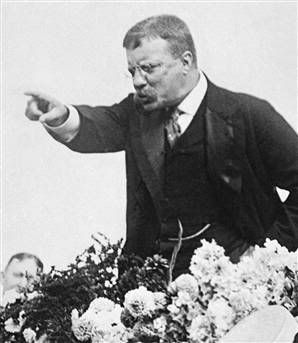
Roosevelt in full patriotic mood
One of the first tasks to which Roosevelt committed his administration was in affirming the United States’ position within the alliance by pressing for a declaration of war on Austria-Hungary, Bulgaria and the Ottoman Empire. This attitude had a double purpose: to prove to her partners that the United States was serious about fighting the war, but also to increase the United States’ weight in any peace concluded with this three powers, which was endorsed by Congress even if many members wondered about what Austria-Hungary, Bulgaria or the Ottoman Empire had done to warrant the belligerency of the United States. In fact, this declaration of war would carry little results, as Roosevelt was already a decisive ‘westerner’, believing in the primacy of the western front as a theatre for fighting the German Army, and the relatively small value of fighting elsewhere
However, the United States was wholly unprepared for the conflict ahead of her. The professional army comprised 98,000 strong -of whom 45,000 were stationed at overseas bases such as the Phillipines- and about 29,000 were needed for home defence. Worse still, its equipment was obsolete and ill supplied, possessing just 400 outdated guns and ammunition for just a few minutes of lively fire. The U.S. Army had 1,500 machine guns and 285,000 Springfield rifles, and, again, the ammunition for them was sorely low. There were no mortars, rifle grenades, hand grenades, flame throwers, heavy howitzers or tanks. The US Army air Service possessed 1,185 serving personnel and some 285 planes by April 1917. Roosevelt envisaged the creation of a ‘National Army’ composed of both volunteers and conscripts. Within six months, he hoped to have nearly six divisions ready to be deployed in France. However, to expand the army required plentiful equipment. Inevitably, the U.S. Army was compelled to rely on British and French equipment, much of it ironically being built in American factories. Yet the huge demands of the U.S. Army would require a considerable conversion of peacetime American industries into the wartime production.
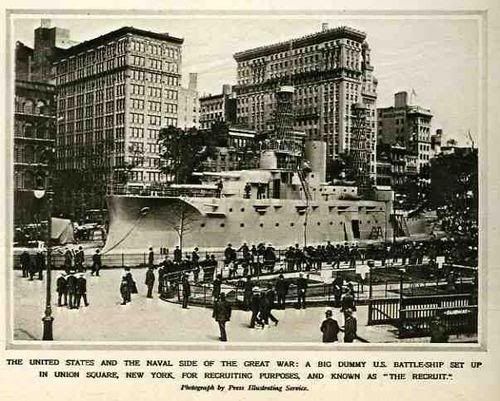
The USS Recruit was a wooden "battleship" located in New York City's Union Square in 1917 as a recruiting tool. "She" was decommissioned in 1920.
It was no surprise that the man selected by President Roosevelt and Major-General Hugh L. Scott, the Army Chief of Staff, a veteran of the Indian Wars, to be the commander of the ‘American Expeditionary Force’ was Brigadier-General John Pershing. During his varied military career Pershing performed frontier duty against the Sioux and Apache from 1886-90, where he won the Silver Star Medal; fought in the Cuban War in 1898; in the Philippines in 1903 against the Moro insurrectionists, where he won Roosevelt’s admiration for his actions; and was an observerver with the Japanese army during the Russo-Japanese war of 1904-5. He was promoted to Brigadier General in 1906. This was followed by the failed Mexican Punitive Expedition (1915) to capture Pancho Villa.
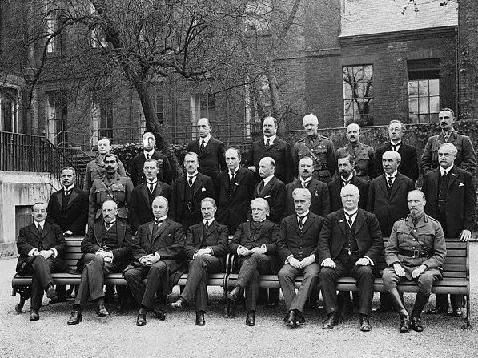
The Imperial War Cabinet in 1917
Meanwhile, in London, statesmen from across the empire convened at 10 Downing Street to discuss the war effort. Lloyd George was an ardent imperialist. His vision of a liberal empire differed in great measure from his predecessor. For the current Prime Minister, it was crucial that Britain oversaw an empire of justice held together by an equal partnership of responsible dominions, each participating on the same basis and contributing to the greater imperial good. Thus was the idea that gave rise to the Imperial War Cabinet, born to co-ordinate the Empire's military policy during the war.
By spring 1917 no one could deny the effort of the Dominions in the fight: on the Western Front, the Canadian Expeditonary Force comprised of three army corps with nine divisions, ANZAC consisted of one New Zealander division plus one Australian army corps with three divisions, whilst South Africa fielded with army corps and three divisions. Furthermore, the ANZAC were also fighting alongside with the British Egyptian Expeditionary Force in Palestine, with a strenght of one New Zealander army corps with two divisions plus two Australian army corps and six divisions. In India, its volunteer army had grown to nearly a million men in size, with a large proportion (three army corps and eight divisions) serving in Mesopotamia. Given such a spectacular commitment, it was difficult to justify the exclusion of India from any imperial gathering, and representatives from India arrived in Britain to have an active participation in the conference.
The Imperial War Cabinet scheme was more ambitious than any imperial venture yet undertaken during the war. It also overshadowed the previous Imperial Conferences of 1902, 1907 and 1911. While Asquith, during his tenure, had neglected the creation of an inter-imperial body, ensuring that relations between Britain and the Dominions were based on trust rather than formal representation, Lloyd George was determined to put to an end to this and to ensure some degree of cooperation between the branches of the imperial family. Australia was represented by her Prime Minister, Billy Hughes, who had had a hard time as the plebiscite to introduce conscription in Australia had been narrowly rejected. After this, Hughes left the Labor Party taking with him about half of the parliamentary party and became Prime Minister of a conservative Nationalist governmen in coalition with the Liberal Party. A general election was expected, and Hughes arrived in London assured that his participation in the Imperial War Cabinet would be of considerable electoral value.
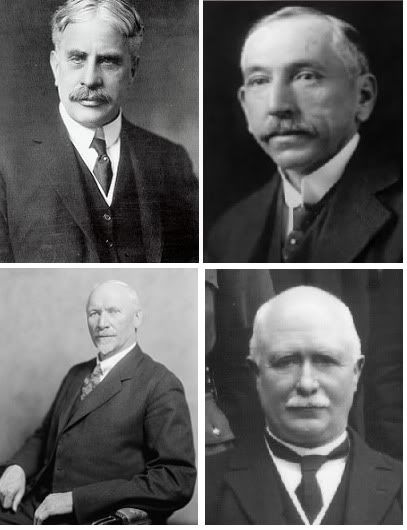
(up) Borden, Hughes (down) Smuts and Massey
Almost all French Canadians opposed conscription: they felt that they had no particular loyalty to either Britain or France. Led by Henri Bourassa, they felt their only loyalty was to Quebec, while English Canadians generally supported the war effort as they felt stronger ties to the British Empire. Thus, Borden decided to solve the matter when, prior to his departure to London, he announced that he would be introducing conscription by the Military Service Act, which became law on August 29, 1917. Military service became compulsory for all males between the ages of 20 and 35. Only men in vital wartime production jobs, those who were sick or conscientious objectors did not have to join the Forces.
South Africa was represented by Jan Smuts, who had commanded the South African Corps on the Western Front. Smuts was ready to support the British Empire, but only if it suited the interests of South Africa. The Indian delegation was led by the newly appointed Secretary of State, Lord Selborne, and included His Highness, General Sir Ganga Singh, Maharaja of Bikaner. From New Zealand came the Prime Minister, William Massey, and Sir Joseph Ward, the Finance Minister. Newfoundland was represented by her Prime Minister, Edward Morris. It was soon apparent that the dominions sought greater influence in the direction of the imperial war effort through the Committee of Imperial Defence.
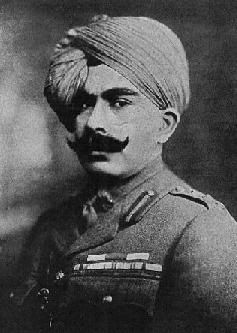
General Sir Ganga Singh, Maharaja of Bikaner.
The proceedings began with a strategic review of the war effort, with the Prime Minister affirming his confidence in General Nivelle’s planned offensive (1) and in the abilities of Field Marshal Haig, and he affirmed too that he was sure that Ottomans were going to be swept from the war in the next few months. Despite of this, and with the costly successes achieved during the battle of the Somme in 1916, Borden and Hughes expressed their concern that Haig was whittling away the Dominions’s strength through excessive use, and maintained their insistence that the Canadian and Australian Corps were kept as a united force. They also insisted on greater accountability to dominion governments for the actions on their armed forces on the Western Front. Lloyd George was sympathetic and complied with suggesting that an imperial army would eventually be created under the command of an officer of the dominion contingents. Of course, both Robertson and Haig disliked this ‘Imperial Army’ scheme but satisfied the demands of Borden and Hughes for independency of command.
The next topic of the meeting was to become the Committee of Prime Ministers scheme, aimed to rule the nature of relations between Britain and the dominions by guaranteeing closer communication between the governments of the empire, granting direct contact of the Dominions with the British Prime Minister instead of having to rely on the Colonial Office and by giving them an independent voice. Eager for greater representation in London, the dominion Prime Ministers were unanimous in their approval. But before they could discuss it into detail, events from France closed the meeting.
(1) This meeting was prior to the Nivelle offensive.
@Enewald: Spain has fun of her own, thank you very much indeed
@Timmie: Old Nicky, I swear it, is glad enough by being rid of the Tsardoom. What will the rest of the Romanovs say? Or Mother Russia? In due time we shall see...
@trekaddict: And if I happen to have the best of worlds, I would end having a 1920s-1940s awfully boring...
@TemplarComander: As stated above this update, Billy is going to behave like a good boy.
@trekaddict -2-: Actually, Kaiser Bill is quite busy trying to find a train bound to Russia
@c0d5579: Too true.
@trekaddict -3-: Absolutely right.
@c0d5579: Right now the Royal Navy, lacking an enemy after beating Germans, Austrians and Turks, is too busy recovering her good old traditions, as good old Winnie stated once (sodomy and rum)
@trekaddict -4-: Not to mention that the sailors may interpret that as some kind of suicide mission and we may get a party in Kiel one year in advance
@c0d5579 -2-: But an armoured cruiser doesn't look like a merchant... Anyway, as stated before, Germany is going to play fair.
@trekaddict -5-: Convoys are finally *yes* being introduced. And just in time, believe me.
@ItsOver9000: A pity you've told me that when I'm reaching the 61st chapter and the end is at hand... :rofl:
@c0d5579 -3-: My thoughts, exactly.
@Viden: Too true.
@Nathan Madien: I think so, but, now I reread Spanish history, the Tsar may have a stroke when Spain goes into a general strike in August 1917, which would last for a week or so, even if it failed in the end... Well, with a bit of luck, he won't notice it... :rofl: I swear it: I was too busy saving the Romanovs that I forgot that "tiny" detail.
Last edited:
Great and Wondrous United State have now creates land battleship for war! United State is unstoppable now! War battleship have now abilities to moved on land!
...
...
@c0d5579: Right now the Royal Navy, lacking an enemy after beating Germans, Austrians and Turks, is too busy recovering her good old traditions, as good old Winnie stated once (sodomy and ron)
Ron???

Couldn't they at least let him get old enough to shave first???
Great and Wondrous United State have now creates land battleship for war! United State is unstoppable now! War battleship have now abilities to moved on land!
...
I have been saying all this time that London and Paris can win this war if they can turn battleships into giant land tanks. Leave it to T.R. to finally make it happen.
I think another Roosevelt should start taking notes right now.

